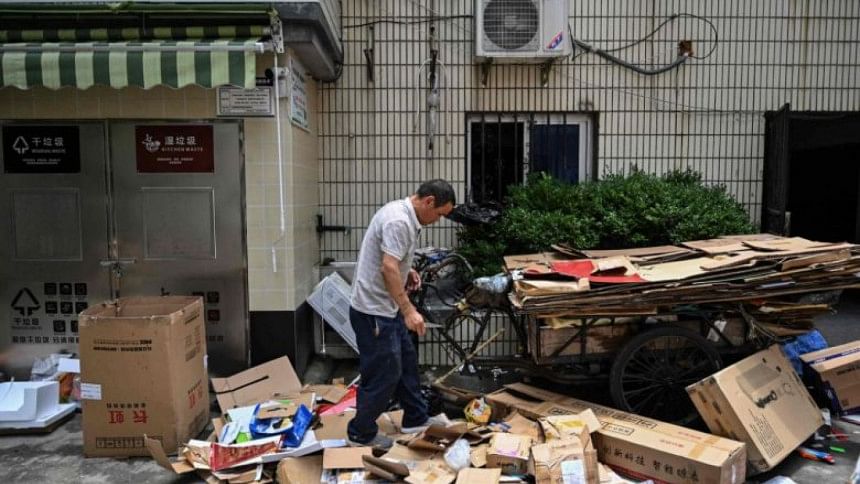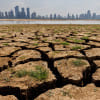Shanghai leads battle against China’s rising mountain of trash

Nie Feng used to toss his rubbish outside his Shanghai flat without a thought while rushing to work, but saving China from a garbage crisis now requires him to consult a complex diagram each morning.
On July 1, Shanghai launched China’s most ambitious garbage separation and recycling programme ever, as the country confronts a rising tide of trash created by increasing consumption.
But the programme is the talk of China’s biggest city for other reasons as well: confusion over rules and fines for infractions, and thousands of volunteers inspecting citizens’ private garbage each day.
Nie examines a wall-sized diagram saying fish and pork bones must be separated from each other, and from the plastic bag he carries them in.
“It’s for the good of our homeland, but we keep making mistakes,” said Nie, a trading company staffer, laughing as he struggled to separate the bag’s contents into various bins.
“We have to get this right before the fines really start.”
Shanghai is piloting a programme set for eventual nationwide adoption in what would likely be the world’s largest waste separation and recycling scheme — and it is desperately needed.
With its 1.4 billion consumers, China is becoming swamped by trash. Every day, Shanghai’s 25 million people alone produce around 26,000 tonnes — equal in weight to the Statue of Liberty.
The issue is straining municipal services nationwide and prompting unrest.
Growing anger
Last week authorities in the central city of Wuhan sent riot police to quell protests by thousands of citizens against construction of a waste incinerator.
China is spending billions of dollars on waste-to-energy incineration plants across the country, but repeated protests have flared over fears they will emit toxins. Wuhan has shelved its plan, for now.
China produced just 30 million tonnes of trash in 1980, but that soared to 210 million in 2017, according to World Bank figures.
That is still less than the world’s trash titan, the United States, which produced 258 million tonnes. But China is gaining fast and the World Bank predicts Chinese garbage could reach a staggering 500 million tonnes annually by 2030.
Several factors are blamed, including rapid growth and the Communist Party’s ongoing push to develop a domestic consumer economy to lessen reliance on the outside world.
Led by the likes of Alibaba, Chinese e-commerce has exploded, producing billions of parcel deliveries annually with their associated packaging.
The government indicated its alarm last year by banning certain imports of foreign waste that it used to accept for years for recycling, a move that has up-ended global garbage flows.
“We need a really big push and I think the government realised that. There is really a sense of urgency,” said Alizee Buysschaert, founder and director of environmental consultancy Zero Waste Shanghai.
With a phased national roll-out set to gain pace next year, Shanghai’s experience has become one of the most talked-about topics in the country, though sometimes for the wrong reasons.
Critics have taken aim at seemingly contradictory sorting guidelines and the limited daily hours during which dumping is allowed, which causes problems for those with irregular schedules.
Chinese media reports also have indicated that a lot of garbage was still entering bins unsorted.
Government officials declined AFP interview requests.
‘So much rubbish’
Previous city-level sorting schemes have fizzled, but Buysschaert sees a difference this time.
“The big shift is that it is much more centralised and it’s incentivized now. That’s really a game-changer because now everyone is talking about it and everyone is involved and on their toes,” she said.
Authorities say strict sorting is crucial, making it far easier to separately process recycled items, hazardous waste, compost and biomass.
But tempers have flared. Chinese media said a 33-year-old woman was detained last week for choking a volunteer sorting inspector unconscious during a rules dispute.
Fines range from 200 yuan ($29) for household infractions to 50,000 yuan for businesses, though authorities are going easy on imposing them for now.
The scheme is a business opportunity for others, with start-ups offering app-based garbage collection and sorting services.
True to form, the Communist Party is pushing obeisance via a public campaign larded with red banners emblazoned with revolutionary exhortations such as “storm the citadel of trash sorting.”
“We weren’t used to it at first. It was really inconvenient,” said 67-year-old pensioner Zhou Shenzhu.
But she has been won over by a noticeable reduction in flies and odour since sorting started, she says.
“The propaganda on television says we face great harm if we don’t separate.”
“Shanghai has lots of people, and so much rubbish. So much!”

 For all latest news, follow The Daily Star's Google News channel.
For all latest news, follow The Daily Star's Google News channel. 








Comments